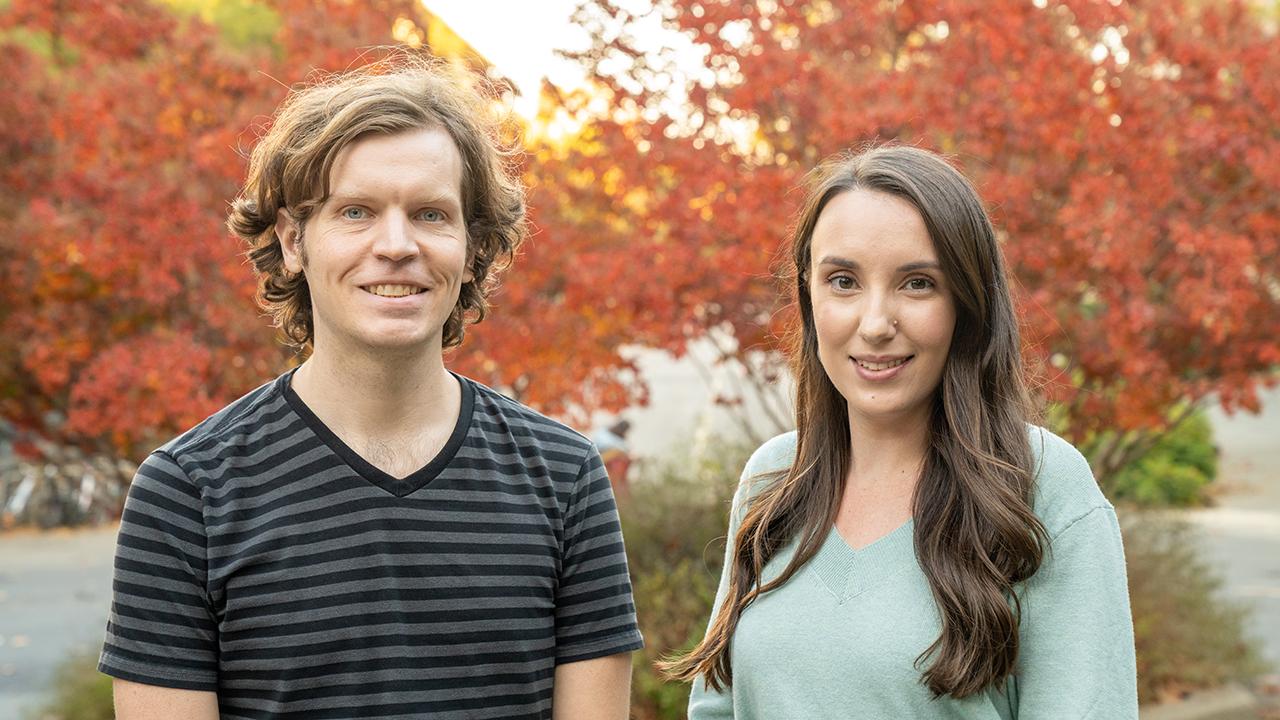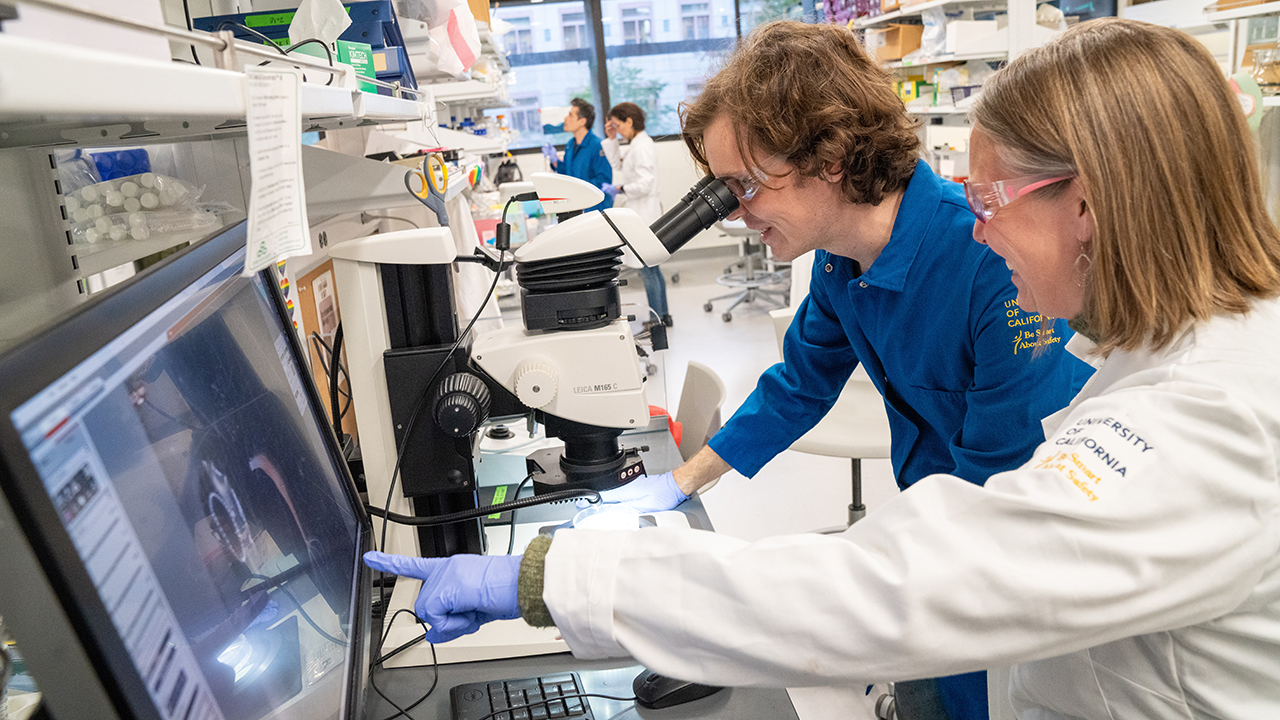
Postdoctoral Researchers Awarded Hartwell Fellowships to Probe Tissue Regeneration and Molecular Roots of Dystonia
Fellowships will fund innovative biomedical research on cellular migration and protein-related underpinnings of dystonia, a heritable neurological disease
Ben Cox and Rebecca McGillivary, postdoctoral researchers in the Department of Molecular and Cellular Biology, are among 10 early career scientists selected to receive 2022 Hartwell Biomedical Research Fellowships, which were announced in August, 2023.
The Hartwell Foundation, which supports innovative and cutting-edge biomedical research that may benefit children, provides fellows with $100,000 in funding, split between two years.
Using a Jellyfish Relative to Model Tissue Regeneration
Cox will use his fellowship funds to study the mechanisms underlying the regenerative abilities of Hydra vulgaris, a small freshwater animal that is related to jellyfish. Hydra can regenerate their entire bodies—head, mouth, and tentacles—from small tissue fragments within only days.
It’s unclear how exactly Hydra achieve this, but it seems to rely on cellular migration through the extracellular matrix (ECM), a network of proteins, sugars and other molecules that exists between the cells of multicellular organisms.
“The ECM is central to the existence of multicellular organisms,” says Cox. “It helps keep cells bound together, it provides stiffness and protection, and it also helps transmit signals between cells.”

Cells migrate through the ECM during embryonic development, and mistakes in this process can result in birth conditions such as cleft palate. Cellular migrations through the ECM also occur during wound healing, and abnormal ECM migrations have been linked to pediatric cancers including neuroblastoma and osteosarcoma.
Because the ECM’s core components are common to all animals, researchers can learn a lot about human ECM by studying model organisms, and Hydra’s regenerative abilities make it an ideal organism in which to study the mechanics of ECM migration during tissue regeneration.
“I’m looking at how stem cells get where they need to go when you’re building a tissue,” says Cox. “If a Hydra gets its head cut off, it needs to build a new head, and to do that cells need move into the new head and into different cell layers. In a lot of cases that involves moving through extracellular matrix.”
Cox suspects that the ECM must degrade during regeneration in order for cells to pass through. To test this hypothesis, he’s using fluorescent microscopy to observe how stem cells migrate through a Hydra’s regenerating body and to test whether limiting ECM degradation impacts its ability to grow a new head.
“Ben is a rigorous and creative scientist who is breaking new ground in our understanding of how extracellular components impact developmental processes,” says Celina Juliano, Cox’s advisor and an associate professor in the Department of Molecular and Cellular Biology.
As well as improving our understanding of developmental processes, Cox’s work has potential applications in cancer research and tissue regeneration.
“We humans are pretty bad at regenerating our tissues, but I think we can look to the regulation of biological processes in animals that regenerate as a potential path for regeneration in human bodies,” says Cox. “It's a lofty goal but it's something that could one day be monumental for human health.”
Exploring How Protein Interactions Cause Disease
McGillivary will use her Hartwell fellowship funds to study proteins involved in the development of dystonia, a neurological disease associated with uncontrolled and painful muscle contractions.
The form of dystonia that McGillivary is focusing on, DYT1 dystonia, is heritable, and symptoms usually begin to develop during childhood or early adolescence. However, individuals carrying the associated genetic mutation don’t always develop the disease.
McGillivary is co-advised by professor Daniel Starr and project scientist Gant Luxton in the Department of Molecular and Cellular Biology.
“Rebecca is a fearless and creative scientist,” says Starr. “Her experience, skills, and passion for interdisciplinary biomedical research perfectly position her to be a very successful budding independent scientist.”

“We are beyond lucky to have Rebecca in our joint laboratory and we cannot wait to see what she will uncover,” says Luxton.
McGillivary is investigating two proteins that she hypothesizes are involved with dystonia—the LINC complex, which attaches the nucleus to the cytoskeleton, and torsinA, which regulates assembly of the LINC complex.
Notably, the DYT1 dystonia mutation involves a small change to the torsinA protein, but it’s unclear how this change results in dystonia. McGillivary suspects that the mutation causes problems at the cellular level, and her goal is to gain a detailed and quantitative understanding of how torsinA interacts with the LINC complex and how both are individually affecting the cell’s mechanical properties.
“We know from patient-derived cells that this mutation in torsinA is associated with alterations to the mechanical properties of the cell itself, like the cell’s relative stiffness or squishiness.”
In the long-term, this understanding could help develop much-needed treatments for dystonia.
“If we can understand how the cell’s mechanical properties are being altered by torsinA and the LINC complex, that may help identify possible target for drugs or other treatments,” says McGillivary.

About the Foundation
The Hartwell Foundation is a non-profit organization that supports innovative and cutting-edge biomedical research. Awarded annually since 2006, the foundation’s Biomedical Research Fellowships support early-career scientists by enabling them to pursue further specialized training at select research institutions in the United States
Media Resources
- Liana Wait is a freelance science writer based in Philadelphia. She has a Ph.D. in ecology and evolutionary biology and specializes in writing about the life sciences.
